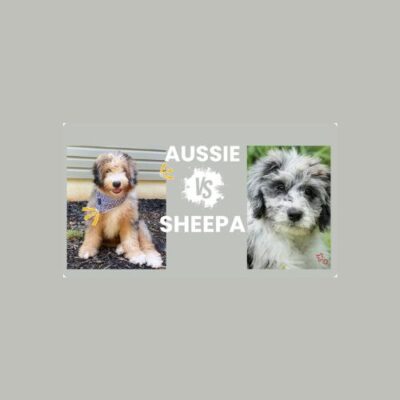If you’re considering bringing an Aussiedoodle into your life, you’re in for an adventure! Aussiedoodles, a cross between the intelligent Poodle and the energetic Australian Shepherd, are affectionate, smart, and full of personality. But before you make any decisions, it’s essential to understand what this unique breed needs, what they bring to the table, and how they might fit into your life. Here are questions every future Aussiedoodle owner should ask—answered to help you make an informed choice!
1. What is an Aussiedoodle, and how are they bred?
This is a mixed-breed dog, a blend of the Poodle and the Australian Shepherd. Breeders typically use a Standard Poodle, but some also breed with Miniature Poodles, resulting in a range of sizes and appearances in the Aussiedoodle family. This crossbreed aims to combine the Poodle’s hypoallergenic coat with the Australian Shepherd’s active and playful nature.
2. What does an Aussiedoodle look like?
Aussiedoodles have no set breed standard for appearance, so you’ll see various coat colors and patterns, including merle, black, cream, apricot, and even tri-colored. Their coats are typically wavy to curly, which means they’re lower-shedding than most, but require regular grooming.
3. How big do Aussiedoodles get?
This breed can vary greatly in size. There are toy, mini, and standard sizes, which can range from as little as 15 pounds to over 70 pounds. The size depends on the specific pairing of the parent dogs, so always ask your breeder about the expected size of the puppies.
4. What is their temperament like?
This breed are intelligent, energetic, and friendly. They’re known for being social dogs who enjoy spending time with their families and are often good with children and other pets. However, individual personalities can vary based on their parents and upbringing.
Learn More: Pros and Cons Of Owning An Aussiedoodle
5. Are AussieDoodles Good Family Dogs?
Absolutely! AussieDoodles are often described as one of the best family dog breeds. They’re known for being affectionate, intelligent, and great with kids, making them wonderful companions for families of all sizes. Plus, they’re low-shedding and hypoallergenic, perfect for households with allergy concerns.
6. Do Aussiedoodles get along with other pets?
Yes, Aussiedoodles are typically friendly and sociable with other pets. Early socialization is key to ensuring they grow up comfortable around other animals.
7. What is their temperament like?
Aussiedoodles are intelligent, energetic, and friendly. They’re known for being social dogs who enjoy spending time with their families and are often good with children and other pets. However, individual personalities can vary based on their parents and upbringing.
8. Do AussieDoodles Have Blue Eyes?
It’s possible! Some AussieDoodles inherit blue eyes from the Australian Shepherd side of the family, especially if they have a merle coat. Other common eye colors include brown, hazel, and even unique marbled hues.
9. What’s the Typical Lifespan of an AussieDoodle?
With proper care, AussieDoodles have an average lifespan of 12-15 years. Providing them with a balanced diet, regular exercise, and veterinary care can help ensure they stay healthy and happy well into their senior years.
10. How Much Exercise Do AussieDoodles Need?
This are an active breed, so they require at least an hour or two of active play and exercise daily to keep their energy levels in check. Activities like long walks, fetch, and playtime are essential. They also love mentally stimulating games to keep their sharp minds busy!
11. Are AussieDoodles Easy to Train?
Yes, they are! are known for their intelligence and eagerness to please. With early socialization and consistent training, they can pick up commands quickly. They’re also emotionally intuitive, making them a joy to train and bond with.
12. What type of training works best for Aussiedoodles?
Using rewards and praise works very well with Aussiedoodles. They respond best to consistent training sessions that are interesting and keep them engaged.
13. How Do You House-Train an AussieDoodle?
Doodles are relatively easy to house-train, and many are 90% potty-trained by 4 months old. Smaller dogs may take a bit longer than larger ones to be fully trained. It’s best to start training at a young age and to teach them to go pee outside the home.
14. Can Aussiedoodles participate in dog sports?
Yes! they are great at agility and obedience sports because they’re smart and love to learn. Dog sports are an excellent way to give this active breed both physical and mental exercise.
15. Can Aussiedoodles live in apartments?

While AussieDoodles are adaptable, they do best in homes with access to outdoor space where they can burn off energy. Apartment living can work if you’re committed to daily exercise and mental stimulation, but a house with a yard may be more ideal.
16. Can AussieDoodles Be Left Alone?
While it’s generally not recommended to leave an AussieDoodle alone for extended periods, adults can manage up to 4-6 hours with proper training. Puppies, on the other hand, should have company and regular breaks to prevent boredom and anxiety.
17. What’s the Best Way to Groom an AussieDoodle?
Regular grooming is a must for AussieDoodles. Plan on brushing your dog a few times a week to prevent matting, and scheduling grooming appointments every 6-8 weeks to keep their coat looking its best.
18. What are the grooming requirements for an Aussiedoodle’s coat?
Due to their often curly or wavy coats, Aussiedoodles need regular grooming, including brushing a few times a week to prevent tangling and professional grooming to keep their coat manageable.
19. What are some common health issues in Aussiedoodles?
Aussiedoodles are generally healthy, thanks to hybrid vigor, but they can still inherit genetic conditions from both parent breeds, like hip dysplasia, progressive retinal atrophy (PRA), and some heart issues. Working with a breeder who conducts health testing is crucial.
20. Are AussieDoodles Prone to Separation Anxiety?
AussieDoodles are known as “Velcro Dogs” because of their desire to be close to their humans. They can develop separation anxiety if left alone for long periods, so crate training and gradual alone time can help ease this.
21. Are AussieDoodles Hypoallergenic?
Yes, AussieDoodles are often described as hypoallergenic due to their low-shedding coats. While no dog is completely allergen-free, they tend to produce fewer allergens than other breeds, making them a good choice for allergy-sensitive households.
22. Do Aussiedoodles have herding instincts?
Some Aussiedoodles inherit herding instincts from their Australian Shepherd parent, which can manifest as nipping or chasing. If this is the case, proper training can help redirect these behaviors into games or exercises.
23. Do AussieDoodles Bark a Lot?
This breed are not typically excessive barkers, but they may bark if they’re bored or experiencing separation anxiety. Early training and plenty of mental stimulation can help prevent unwanted barking behaviors.
24. How Often Should I Feed My AussieDoodle?
Puppies typically need three meals a day, while adults can be fed twice a day. Consult your vet to determine the exact portions based on your dog’s weight, age, and activity level. A high-quality diet is key to keeping your AussieDoodle in great shape, So It’s important to provide a nutritious diet and offer healthy fruits as snacks, but fruits should not replace regular meal.
25. Do AussieDoodles Like to Swim?
Most AussieDoodles love the water! Thanks to the Poodle’s water-loving background, many AussieDoodles take to swimming naturally. Early exposure can help them become confident swimmers, which is a great way for them to exercise.
26. Do AussieDoodles Like Cuddling?
Yes, they do! This breed is known for their affectionate and loving nature. They’re likely to become your little cuddle buddy and thrive on close companionship with their family members.
27. What Coat Colors Do AussieDoodles Have?
This breed can have a variety of coat colors, including merle, apricot, black, and tri-color. Each AussieDoodle’s coat is unique, showcasing the broad spectrum of shades inherited from Poodles and Australian Shepherds.
28. How Much Do AussieDoodles Cost?
This breed can range in price depending on factors like breeder reputation, location, and parentage. Expect to invest between $1,500 and $4,000 for a quality AussieDoodle, with some high-end breeders charging more for specific traits or lineages.
29. Is an AussieDoodle Right for Me?
If you’re looking for an intelligent, affectionate, and active companion who will keep you entertained and be a loyal friend, an AussieDoodle might be a great fit. Just remember that they thrive in active homes where they’re given lots of love, attention, and stimulation.
30. What Is an F2 AussieDoodle?
An F2 AussieDoodle is what we call a second-generation Doodle. This occurs when two F1 AussieDoodles (50% Australian Shepherd and 50% Poodle) are bred together. The resulting puppies are still a mix of Australian Shepherd and Poodle, but the traits can vary more widely compared to F1 or F1B generations. Some F2 Aussie might lean more toward one parent’s traits, making each litter unique.
31. What Does F1B Mean for AussieDoodles?
An F1B AussieDoodle is a special kind of AussieDoodle mix. It’s the result of breeding an F1 AussieDoodle (50% Australian Shepherd, 50% Poodle) back to a purebred Poodle. This results in a puppy that’s about 75% Poodle and 25% Australian Shepherd. F1B are often preferred by families who want a low-shedding, more hypoallergenic coat, as the increased Poodle genes tend to amplify these traits.
Learn More: F1B Aussiedoodle Puppies | Case Study | Care
Learn More: F1 vs F1B Doodle | Aussiedoodle | What the Difference
Conclusion
Considering an AussieDoodle? We hope these answers have helped you learn more about what makes this breed special and what to expect as a future AussieDoodle parent. Remember, adopting a dog is a long-term commitment, and with an AussieDoodle, you’ll be gaining a loyal friend for years to come!











No Comment! Be the first one.